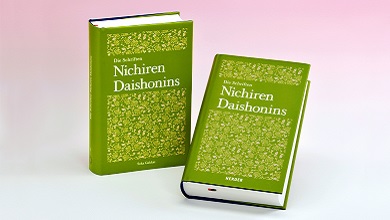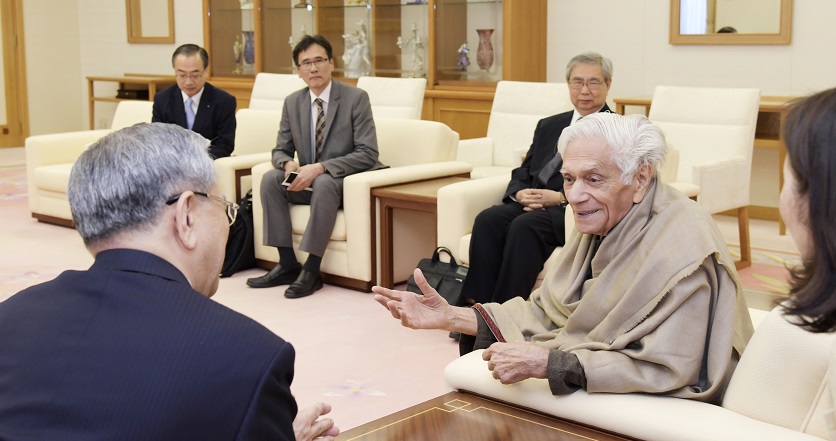Living the Bodhisattva Ideal: A Conversation with Prof. em. Helwig Schmidt-Glintzer

Helwig Schmidt-Glintzer, Professor emeritus of East Asian Literature and Cultural Studies at the University of Göttingen in Germany, and an expert in Buddhist studies, supervised the German translation of The Writings of Nichiren Daishonin that were published in 2014. In the following interview, carried in March 2021 in the Seikyo Shimbun, the Soka Gakkai’s daily newspaper, Prof. em. Schmidt-Glintzer discusses the relevance of Nichiren’s philosophy today and what we can gain from living the bodhisattva ideal.
Having worked on the translation of the German edition of The Writings of Nichiren Daishonin, what was your impression of Nichiren as a person?
Nichiren was a successful teacher. He realized that the Buddha way is attained through practicing the teachings of the Lotus Sutra, and he was not deterred by hostility and persecution but continued to seek out dialogue with others.

This is why he became so influential as a teacher and why his teachings were so persuasive. Looking at the vast number of writings he left behind, it is clear he sought to have open dialogue with and offer encouragement to everyone who came to him. At the same time, he held fast to his convictions, which were firmly based on the teachings of the Lotus Sutra. In order to guide the people of his age, he made every effort to explain why his teachings were correct and why he deemed other teachings erroneous. In this process, he continued to test his realizations. He demonstrated through his life that a person can continue to have hope and conviction in the face of any adversity.
Because, as Nichiren taught, the Buddha nature is inherent in every living being, we must strive to manifest it. This is the prerequisite for release and liberation and for the realization of a harmonious world. It is only through pursuit of the attainment of Buddhahood in one’s present form that those powers are released.
What do you think Nichiren was trying to convey to the political and religious leaders and ordinary people of his time?
Nichiren was a person with a strong determination to never be defeated [by adversity]. He wanted to awaken others to the crisis of the times and empower them to be able to discern false teachings. At the heart of his teachings was the core principle expressed in the second and sixteenth chapters of the Lotus Sutra that Buddhahood is inherent in all life.
This is the essence of the so-called Mahayana or “Great Vehicle” Buddhism, which gave expression to the ideal of the bodhisattva. A bodhisattva does not enter nirvana even after attaining enlightenment. Instead, the bodhisattva, with compassion and affection, chooses to help those who are suffering and in distress. Bodhisattva Never Disparaging, depicted in the 20th chapter of the Lotus Sutra, is a prime example of this, showing deep respect to all people with the words: “I have profound reverence for you, I would never dare treat you with disparagement or arrogance. Why? Because you are all practicing the bodhisattva way and are certain to attain Buddhahood.” This assertion, “You are certain to attain Buddhahood,” is a great promise to all.
The Bodhisattva Ideal and Self-Actualization
What do you think is the significance of Nichiren’s philosophy today, 800 years later?
Nichiren reminds us of the path of the bodhisattva, who does not strive just for his own salvation and perfection but also embraces other living beings. It is a teaching of human empathy which, at the same time, constitutes the foundation for peace. The bodhisattva strengthens trust and compassion between people.
Nichiren’s teachings open up a new perspective and sensitivity in our present period of crisis when the peace and prosperity of humanity is at stake.
For Nichiren, chanting Nam-myoho-renge-kyo together with reciting portions of the Lotus Sutra, is the way to bring forth Buddhahood. Believing in one’s own Buddha nature as well as in that of other’s and respecting human beings under all circumstances is the essential practice of a bodhisattva.
The bodhisattva figure has been and continues to be the central message of Buddhism, one that is directly accessible to the individual in modern society. Nichiren embodied this ideal, basing himself on the Lotus Sutra. It is an ideal that links one’s own salvation with respect for the dignity of all life. This is a perspective that is apparent to modern day people who are looking for a way to self-actualize, to fully realize their potential. However, most are uncertain about how to achieve this self-actualization. Hence the relevance of Nichiren’s teachings and the bodhisattva ideal: while striving for one’s own awakening, we respect all life, show compassion for those who are suffering and act in accordance with these principles.
People tend to act contrary to this or assume that they do not have the ability to live in this way. So Nichiren’s teachings offer support for this way of life, and his determination and conviction serve as an example and inspiration.
What relevance do you think a translation of Nichiren’s writings has for German society, which is predominantly Christian?
As much as life in Japan 800 years ago might differ from conditions today, Nichiren’s teachings are still resonant. A concern for the happiness and well-being of others, for example, is customary for Germans.
Daisaku Ikeda, third founding president of the Soka Gakkai, wrote in the preface to the German edition of The Writings of Nichiren Daishonin that the people in the German-speaking world are characterized by a profound life philosophy, rich spirituality and a candid humanity, and that he believed Nichiren Buddhism, which teaches the path to one’s own happiness and that of other’s, would find deep acceptance.

I was particularly impressed with the force of Nichiren’s writing. Daisaku Ikeda describes Nichiren’s words as sometimes gently enveloping people like a spring breeze, and sometimes—like those written in severe circumstances—fierce and strict.
But regardless of time and place, peace and security in the world are directly linked to the happiness of the individual. Nichiren’s teachings open up a new perspective and sensitivity in our present period of crisis when the peace and prosperity of humanity is at stake. Optimism, hope and the knowledge that it is possible to change our destiny by manifesting Buddhahood are especially valuable now.
Buddha Nature: The Driving Force
The world is changing rapidly, especially with the onset of the coronavirus pandemic in 2020. What values can individuals today draw from the philosophy of Nichiren Buddhism?
Particularly during times of crisis, the fundamental Buddhist teaching that suffering is inherent in life is a good starting point. The Lotus Sutra is full of wisdom to overcome crises, conveyed through parables such as the three carts and the burning house. It is about having trust in the words of the Buddha as well as in the teachings of Nichiren. In particular, it is about discarding fear and following the Buddha way. Especially during the pandemic, when fear exerts such a controlling influence over people, strong conviction in one’s Buddha nature is fundamental. It will be the driving force for expanding wisdom, courage, compassion and vitality, not only in one’s life but also within one’s family and community.
The Soka Gakkai is a community of people striving to study and put into practice the teachings of Nichiren. What is your view on it?
The Soka Gakkai, which was founded [on November 18, 1930] in Japan during a time of crisis and war, reflects the human need to come together in community. Central to this, as mentioned, is reverence for the inherent Buddha nature of individuals, characterized by the qualities of wisdom, courage, compassion and life force. The support of such a community allows individuals to focus on foregrounding this essential nature through their practice of Nichiren’s teachings. This results directly in an ethos of respect for the dignity of life and conviction that peace is dependent on the happiness of the individual.
The Soka Gakkai cooperates with like-minded individuals and organizations that strive for the individual’s happiness and world peace, though its core endeavor is the establishment of the correct teaching for the peace and happiness of humanity and the spread of the Buddhist law. At the same time, the practice of chanting Nam-myoho-renge-kyo, expressing the essence of the Lotus Sutra, is aimed at the well-being of both oneself and others. It’s clear that Nichiren’s teachings, though they originate eight centuries ago, have universal validity that transcends time and social difference.
Daisaku Ikeda writes [in the preface to the German translation of The Writings of Nichiren Daishonin] that Nichiren demonstrates the mission and practice of a bodhisattva who strives for the happiness of all people. He awakens others to this mission and urges them to dedicate themselves to it. This is a path with universal validity.
That is why I hope that by 2030, when Soka Gakkai celebrates its 100th anniversary, the second volume of the German version of The Writings of Nichiren Daishonin will be published and that Nichiren’s teachings will spread even more widely around the world.







